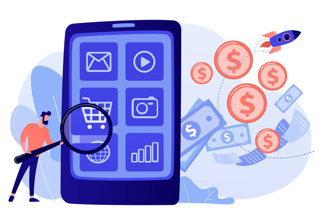What is App monetization?

App monetization is the process of app developers or publishers making revenue through payments from app users. The revenue generated should be sustainable for app publishers and app developers. Various models are at play when it comes to monetization, like ads, in-app purchases, and subscriptions. The market for mobile app revenue is huge and in continuous growth; experts expect it to reach $614 billion in 2026.
History of App monetization
Apple Inc. introduced mobile apps in 2008, with the release of the first iPhone. Back then, most apps were premium or paid, but starting in 2009, the number of premium apps plummeted with the rise of freemium apps and in-app purchases. In 2013, 90% of all iOS apps were installed for free. Although 50% of smartphone users have never paid for an app, free apps still make more money than premium apps, as 98% of all app revenue comes from free mobile apps.
Models
Paid apps
The first monetization model is paid apps; ones that cost money to install. This type isn’t very common, as 96% of Android apps and 92.2% of all iOS apps are free. There are various reasons why developers opt for free apps. One of them is that they have other means to monetize the app, and another reason is that free apps get better reviews, improving their App Store optimization.
Free apps with paid ads
Paid ads are the most popular app monetization method and are the preferable model by users. The reason is that with paid apps, users can enjoy free perks, and developers still make money. There are four formats of in-app advertisements, banner ads, native ads, interstitial ads, and rewarded video ads.
Free apps with in-app purchases
In addition to paid ads, some free apps contain in-app purchases. Users can either play for free or access extra features and play more levels for a fee. In some apps, players get access to paid features if they wait a certain period or do specific tasks like watching video ads. Revenue generated from in-app purchases is estimated to be $50.1 billion.
Freemium apps
The freemium model was adapted and made popular in mobile apps with the release of iOS 3.0. Freemium apps are free with an available paid subscription to unlock all features or some of them. Most subscriptions are divided into tiers, the more you pay, the more you features you get.
Subscriptions
App subscriptions are more or less similar to the freemium model. The difference is that every feature requires payment in the subscription model. However, in most cases, users get a free trial to try the service before subscribing. Usually, the subscription is monthly, bi-annually, and annually with a discount for users who opt for a yearly subscription.
Notable App Monetization Platforms
Google AdMob
AdMob was started in 2006 by Omar Hamouni, as a subsidiary of Google. In 2013, the technology of AdMob was rebuilt using other technologies like AdSense to help developers grow their businesses. AdMob provides ad solutions for all major mobile operating systems and browsers, including but not limited to Android, iOS, webOS, Flash Lite, Windows Phone, and others.
Google Ad Manager
In 2018, with the rebranding of various Google services, DoubleClick for Publishers, and DoubleClick Ad Exchange, two separate advertising services got reintroduced as Google Ad Manager. Google Ad Manager is an advertising management platform for app publishers that make large direct sales from ads. Companies can use it to monetize their websites, mobile apps, videos, or games. Google Ad Manager also manages ad revenue for companies that make money from direct sales from buyers.
AppLovin
AppLovin started in 2012 but stayed in stealth mode until 2014. The company specializes in aiding app developers in marketing, App monetization, analyzing, and publishing their apps. AppLovin was an immediate success after launching, even before emerging from stealth mode. By 2014, it had already acquired customers like Spotify and OpenTable. In 2014, they Purchased Moboqo, a German mobile ad network. In 2021, they purchased the formerly Twitter-owned company MoPub for $1.1 million. The acquisition was finalized in January 2022.
